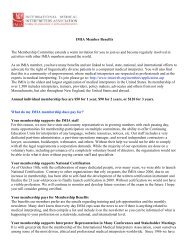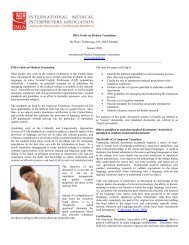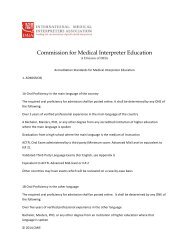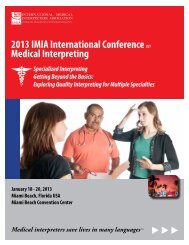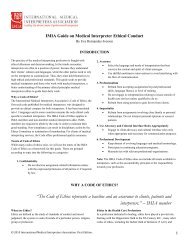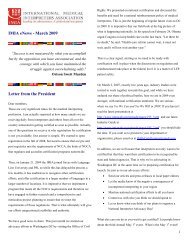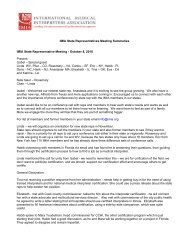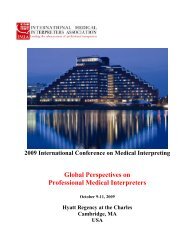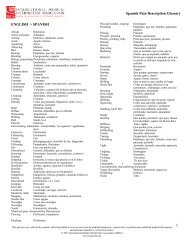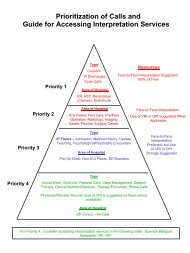improving the quality of mental health interpreting in victoria
improving the quality of mental health interpreting in victoria
improving the quality of mental health interpreting in victoria
Create successful ePaper yourself
Turn your PDF publications into a flip-book with our unique Google optimized e-Paper software.
“detailed descriptions <strong>of</strong> torture and trauma that may necessarily emerge as part <strong>of</strong> <strong>the</strong><br />
<strong>the</strong>rapeutic process” (Lipton et al., 2002, p. 3). In this process <strong>the</strong>y must “not only listen<br />
empa<strong>the</strong>tically … but <strong>the</strong>y are also required to repeat it, <strong>of</strong>ten f<strong>in</strong>d<strong>in</strong>g it necessary to locate<br />
language that will appropriately transmit <strong>the</strong> client’s mean<strong>in</strong>g … without adequate time for<br />
process<strong>in</strong>g <strong>the</strong> details” (Lipton et al., p. 3-4). This <strong>in</strong>direct experience <strong>of</strong> ano<strong>the</strong>r’s trauma<br />
is recognised as potentially be<strong>in</strong>g associated with vicarious traumatisation (Lipton et al.,<br />
2002). Interpreters may feel overwhelmed by <strong>the</strong> material <strong>the</strong>y must translate, or fear<br />
becom<strong>in</strong>g overwhelmed (p. 3), but at <strong>the</strong> same time <strong>the</strong>y believe that requirements <strong>of</strong><br />
confidentiality prohibit <strong>the</strong>m from seek<strong>in</strong>g personal support. They also may feel a sense <strong>of</strong><br />
powerlessness as <strong>the</strong>y had entered <strong>the</strong> pr<strong>of</strong>ession with altruistic aspirations <strong>of</strong> assist<strong>in</strong>g<br />
<strong>the</strong>ir compatriots (Lipton et al., 2002). It is po<strong>in</strong>ted out too that <strong>in</strong>terpreters who are<br />
traumatised are at both physical and psychological risk, but many <strong>of</strong> <strong>the</strong> <strong>in</strong>terpreters<br />
surveyed had no understand<strong>in</strong>g <strong>of</strong> <strong>the</strong>se risks associated with <strong>the</strong>ir work. For <strong>the</strong>se reasons<br />
Lipton et al. (2002) argue that <strong>the</strong> <strong>mental</strong> <strong>health</strong> system has a duty <strong>of</strong> care towards <strong>the</strong><br />
<strong>in</strong>terpreter.<br />
The area <strong>of</strong> forensic <strong>mental</strong> <strong>health</strong> is particularly problematic. It can be very difficult for<br />
forensic <strong>mental</strong> <strong>health</strong> services to reta<strong>in</strong> <strong>in</strong>terpreters because <strong>the</strong> nature <strong>of</strong> <strong>the</strong> work<br />
<strong>in</strong>volves hear<strong>in</strong>g <strong>the</strong> details <strong>of</strong> <strong>mental</strong>ly ill forensic patients and <strong>the</strong>ir behaviour toward <strong>the</strong>ir<br />
victims, who are <strong>of</strong>ten family members and children or <strong>in</strong>nocent members <strong>of</strong> <strong>the</strong> public.<br />
This type <strong>of</strong> cl<strong>in</strong>ical <strong>in</strong>vestigation <strong>in</strong>evitably conjures up disturb<strong>in</strong>g images which are very<br />
difficult to dissipate from <strong>the</strong> m<strong>in</strong>d without <strong>the</strong> provision <strong>of</strong> pr<strong>of</strong>essional supervision. The<br />
result may be ‘vicarious traumatisation’ where <strong>the</strong> person is affected by <strong>the</strong> details and<br />
images to <strong>the</strong> extent that <strong>the</strong>y <strong>in</strong>trude <strong>in</strong>to thoughts at any time, overtake daily life, affect<br />
sleep, create anxiety and fearfulness, and may affect <strong>the</strong> person’s personal relationships.<br />
This may be particularly so <strong>in</strong> <strong>the</strong> case <strong>of</strong> a sexual crime and <strong>the</strong> accompany<strong>in</strong>g explicit<br />
forensic <strong>in</strong>vestigation.<br />
There are clear procedures <strong>in</strong> place <strong>in</strong> <strong>mental</strong> <strong>health</strong> services for <strong>mental</strong> <strong>health</strong><br />
pr<strong>of</strong>essionals to receive debrief<strong>in</strong>g if <strong>the</strong>y have experienced psychological trauma as a result<br />
<strong>of</strong> <strong>the</strong>ir work with clients and families (Better Health Channel, 2004; Debrief<strong>in</strong>g Program,<br />
not dated). These procedures have been implemented to enable staff to cope with <strong>the</strong>ir<br />
emotional reactions, which, if not dealt with, may result <strong>in</strong> quite disabl<strong>in</strong>g psychological<br />
symptoms. The Ethnic Mental Health Consultant’s enquiries <strong>in</strong> 2003 suggested that<br />
<strong>mental</strong> <strong>health</strong> service policy does not extend <strong>the</strong>se procedures to <strong>in</strong>terpreters. This may<br />
reflect <strong>the</strong> relatively <strong>in</strong>visible status <strong>of</strong> <strong>in</strong>terpreters <strong>in</strong> <strong>mental</strong> <strong>health</strong> services: whereby <strong>the</strong><br />
<strong>in</strong>terpreter’s role is seen as merely ‘a conduit’ or ‘a mouthpiece’ between <strong>the</strong><br />
communicat<strong>in</strong>g parties. This can be from both <strong>the</strong> <strong>in</strong>terpreter’s own perspective and that <strong>of</strong><br />
<strong>the</strong> <strong>mental</strong> <strong>health</strong> cl<strong>in</strong>ician. This position is backed up by a <strong>the</strong>ory <strong>of</strong> <strong><strong>in</strong>terpret<strong>in</strong>g</strong> which<br />
“def<strong>in</strong>es <strong>the</strong> <strong>in</strong>terpreter as a language facilitator between two or more parties who does not<br />
o<strong>the</strong>rwise participate <strong>in</strong> <strong>the</strong> communication” (De Jongh, 1991). If we subscribe to this<br />
idea, we are <strong>of</strong> course guilty <strong>of</strong> dehumanis<strong>in</strong>g <strong>the</strong> <strong>in</strong>terpreter whose heart and m<strong>in</strong>d is<br />
always present, despite <strong>the</strong> expectation <strong>of</strong> pr<strong>of</strong>essional distance. Interest<strong>in</strong>gly from a legal<br />
perspective, all parties present, <strong>in</strong>clud<strong>in</strong>g <strong>the</strong> <strong>in</strong>terpreter, are considered to be <strong>in</strong>tricately<br />
16




